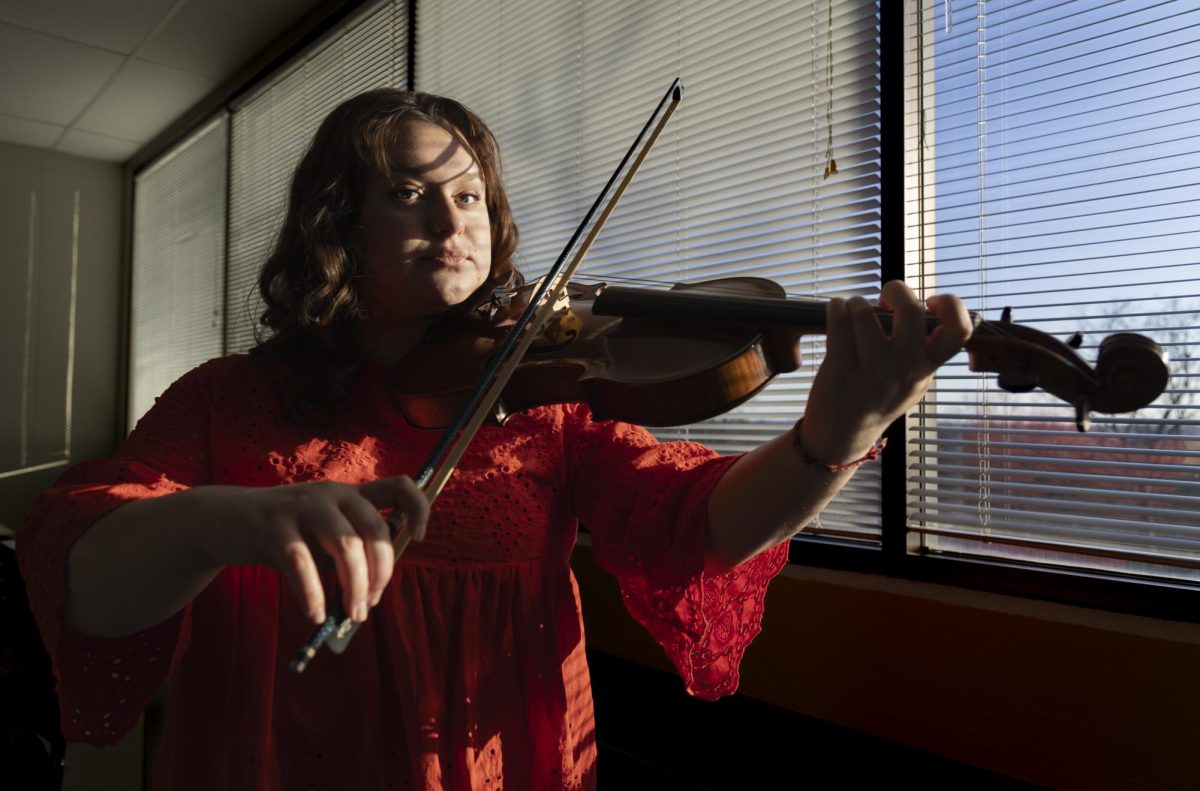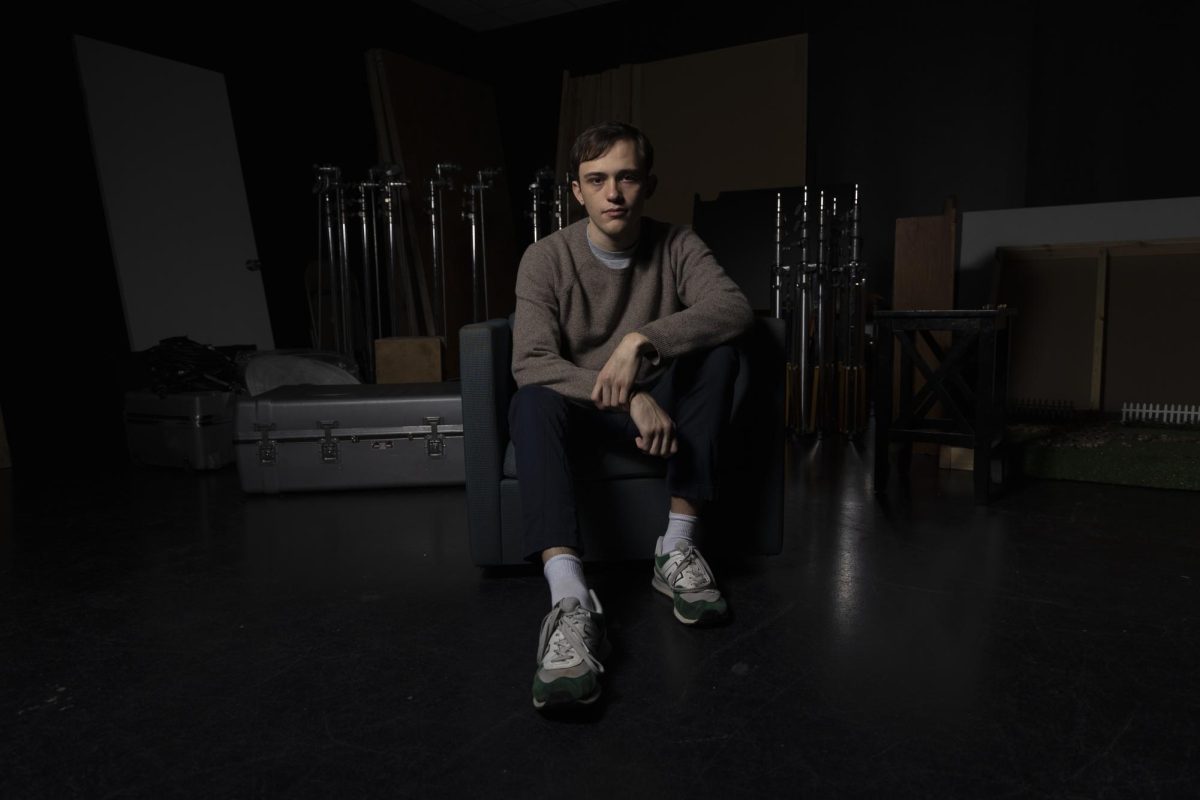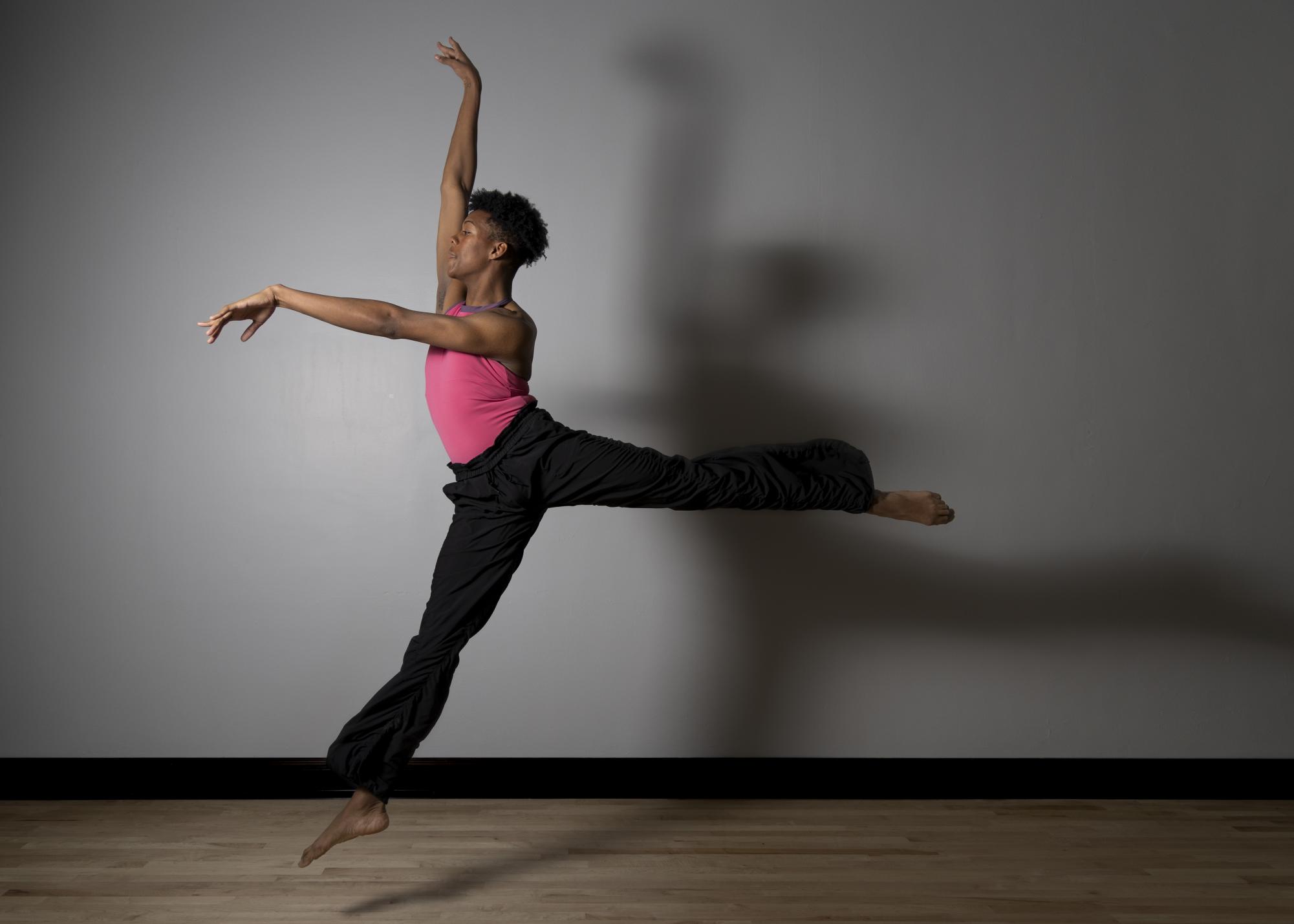NATHAN NEAL
Nathan Neal, a sophomore dance major, initially started dancing when he joined his peers in an after-school dance program in the 4th grade. Once in middle school, he stopped dancing, but decided to become serious about the art again during his last half of high school.
“When I wasn’t dancing, that’s when I went through one of the most roughest points in my life,” Neal said. “I had no outlet to express anything.”
During his senior year, Neal started going to a dance studio, taking classes and training every day he was able to.
He has learned technique in several dance styles, including tap, jazz, hip- hop, African and modern, with contemporary and ballet being his favorites.
“The way I am able to express myself through the movement is just wonderful,” Neal said.
Wanting to continue his training beyond high school, Neal decided to pursue dance as his major. He participated in the 2022 WKU Summer Dance Intensive, a week-long experience designed to provide high school dancers with the opportunity to see what it would be like to be a student in the dance program.
Neal said that attending the intensive is a big part of what made him want to attend WKU.
“I just loved it so much,” he said.
During his time on campus, Neal has become involved with the WKU Dance Company, the resident dance company for the Department of Theatre & Dance.
Students in the company participate in daily rehearsals that involve learning, practicing and polishing choreography, working with props and establishing staging cues for the annual shows they put on each semester.
Neal will perform in three company and program shows this semester. These include the “Dance Project,” the “Evening of Dance” 50th anniversary and “Last Chance to Dance.”
Neal’s involvement with the Dance Company has provided him with opportunities both on and off campus.
He has a love for choreographing and said it is one of his favorite aspects of dance. He enjoys showing others what he is capable of, hoping to create an interest in dance for the audience.
Neal choreographed a piece for his first “Last Chance to Dance” in the Fall of 2022, his first semester freshman year.
“It was a spur-of-the-moment thing,” Neal said. “I always wanted to choreograph and now that I had the opportunity to do it, I took it.”
This past summer, Neal participated in the Joffrey Ballet School Summer Intensive in New York, training in jazz and contemporary and taught dance classes at a studio in his hometown of Nashville, Tennessee.
As he continues his path as a dancer, Nathan hopes to improve his “willingness” when it comes to dancing.
He explained how he believes those who strive to pursue their art professionally have the tendency to become burnt out, losing their passion and determination.
“With burnout, you start to feel a sense of hopelessness and finding yourself not wanting to pursue what you are chasing,” Neal said.
He said he feels dance is a way for him to express himself when he is not able to verbalize his feelings, and that channeling his emotions through dance is more powerful than his words could be.
“Dance is a form of expression. And no matter who does it, no matter who wants to do it, it’s just a way to let things out, let things go,” Neal said.
However, he said dance does not always have to have emotional expression and can be viewed as simply movement.
“Sometimes you can dance just to dance,” Neal said. “I think that’s more powerful than anything else.”

CHASE WINEMILLER
Music has always been a part of junior music education major Chase Winemiller’s life.
As a child, she would often sing alongside her opera-singer parents. In 6th grade, Winemiller’s parents encouraged her to choose an aspect of music to start devoting her time to.
She has since taken technique classes on the oboe, bassoon, trumpet, french horn, tuba and trombone, can play the guitar and piano and primarily plays the viola.
“I don’t really know what [my] life would be like without music,” Winemiller said.
She said deciding to be a music education major “felt natural” to her.
As a kid, she always considered becoming a teacher, but was unsure of what she would teach.
“I feel like randomly one day it hit me: I can teach music,” Winemiller said.
She said being a music education major has felt “natural” since initially deciding.
Students in the music education program learn several instruments and take voice classes, graduating from the program with a kindergarten to 12th-grade certification, allowing them to teach choir, band, orchestra and elementary school general music.
Winemiller plays viola in the WKU Symphony, a full symphony orchestra that puts on several concerts throughout the academic year.
Additionally, she is the president of the WKU chapter of the American String Teachers Association.
“We provide resources and opportunities for string players at Western and also other musicians that are interested in learning more about strings,” Winemiller said. “We try to put together events to help teach people about stringed instruments.”
She also teaches at the WKU String Academy, a program to teach 5 to 18-year-olds how to play the violin and viola, and at the Guitar Academy of Bowling Green.
Winemiller said her favorite way to make an impact is through the students she teaches.
“I find a lot of joy working with little kids,” Winemiller said.
“I really am passionate about bringing music into schools, especially low-income schools … I really care about bringing those opportunities to kids who otherwise wouldn’t have it.”
Winemiller said musicians are sometimes unfairly judged personally based on their ability to play their instrument.
“I always tell my students, ‘You don’t have to be the best at everything. You are allowed to just play this instrument to enjoy it,’” Winemiller said. “I think I like to express self-love, having grace with myself with my music, and just allowing myself to make music without people judging it.”
Post-graduation, Winemiller hopes to teach general elementary music or strings.
“I mostly just want to bring the joy of music to as many kids as I can,” she said.

GRACIE SILVIA
For Gracie Silvia, senior studio art major, creating art provides her a way to express her emotions and cope with the hardships she has endured.
For most of her life, she had considered art a hobby, learning her first artistic skills from her mother. She started at WKU as a pre-physical therapy major.
However, around her sophomore year, she went through a traumatic event that caused her to not be able to focus in her classes and changed her major.
“I kind of went into the arts to express my trauma,” Silvia said.
She has a passion for sculpture and often uses metal to create her work.
“Some people are better at being connected with painting,” Silvia said. “When I am painting, I find a disconnect from it.”
Silvia said the physicality of creating sculptures allows her to feel “in touch” with her art, both literally and figuratively.
“I’m physically working through it while mentally working through it,” she said.
The studio art program includes tracks for ceramics, painting/drawing, printmaking, weaving and sculpture. Once building fundamental skills in these, students in the program have the opportunity to choose one or a combination of two tracks to focus on.
Students in the department of art and design often take multiple three-hour-long studio classes a day. Silvia said because of the long hours, she has been able to form close bonds with both her classmates and her professors.
“The art community is such an open environment and people are so welcoming,” Silvia said. “Professors and students have helped me really just open up about things that have happened to me [through] my work.”
During the fall 2023 semester, Silvia hosted a gallery of some of her art at the Ivan Wilson Fine Arts Center. She plans to host a gallery again this semester.
Silvia’s favorite part of creating is when she has completed a piece and receives feedback from others.
“I always like to hear what others think because I put all this anger and love into these pieces. And then finally, someone can tell me if it worked, if it didn’t work,” Silvia said. “I just enjoy getting people’s input on my art.”
She is additionally involved with the League of Sculptors, a WKU art student organization whose purpose is to share the art of sculpture by attending conferences and hosting events.
Silvia said that since finding her passion for art, she has obtained a more positive image of herself.
“I’m a lot more comfortable with who I am as a person, even flaws and all,” Silvia said.
She said that she feels that while artists’ work is being critiqued, the artists are often critiquing themselves and their ability to improve.
“Even though that’s mostly in the art, it brings through to me. I always look back … [and] just truly try to understand who I am,” Silvia said.

NICO SILVERTHORN
Nico Silverthorn, sophomore BFA film production major, has always had an interest in storytelling.
He got his first camera for his 12th birthday after gaining an interest in LEGO stop-motion videos on YouTube, wanting to create some of his own.
He discovered his love for film after making his first YouTube video and decided to fully “dive into” the art. During high school, he became involved with several school media organizations, attended film festivals and spent a summer at the Governor’s School of the Arts.
“I literally just tried to make it my whole life,” Silverthorn said.
When applying for college, Silverthorn’s parents were “skeptical” of him becoming a film major. He said they were supportive, but concerned if it could provide him financial stability.
“I told them that film is the only thing I know I want to do,” Silverthorn said. “I’d rather be happy and struggling than doing something I hate. I want to do something that I love, and I love film.”
Only 24 students are accepted into the film production program each academic year based on the quality of their creative portfolio, professionalism and scholastic work after their freshman year.
Silverthorn said that due to the small number of students in the program, it feels like a “little family.”
“Everyone puts what they’re good at to use … you’re all just kind of helping each other create a story. I think it’s beautiful,” Silverthorn said.
Students create a film each of the three years they are in the film production program. Each film is shown during the annual Film Festival at the end of the spring semester.
Silverthorn said a misconception people often have about those who create films is that filmmakers are only successful if they become famous.
“As long as you’re happy and making what you want to make, that should be a success,” Silverthorn said.
When Silverthorn creates films, he likes to tell stories “that seem oddly realistic with a sprinkle of something a little weird.”
When he is writing characters for his films, Silverthorn likes to incorporate aspects of the personalities of people he knows.
“I think everyone is unique and special, and I feel exaggerating that in the story world is such a fun thing to do,” Silverthorn said.
He said this is something director Wes Anderson has done, especially in his early work, that has influenced the way Silverthorn wants to tell stories.
Throughout this semester, Silverthorn will be hosting a free, open-to-all screening series of Wes Anderson’s first eight films in the Jody Richards Hall auditorium.
Silverthorn believes that filmmakers often additionally incorporate aspects of their own personalities into their work.
“Some people say ‘write what you know,’ some people say ‘don’t,’ but I always feel like, no matter what, you can find yourself somewhere within a story,” he said.
For Silverthorn, creating films has been a coping mechanism while allowing him to share his individual experiences and personal outlook on the world.
“Everyone can tell a story. But not everyone’s going to tell it the same way,” Silverthorn said.
Assistant News Editor Ali Costellow can be reached at ali.costellow453@topper.wku.edu



